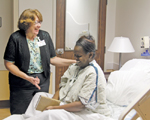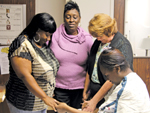|
By
Dawn Brazell
Public Relations
The Rev. Lynn Conklin strikes fear
into the hearts of some of the
patients she visits. They're not
exactly sure why she has come to
visit. They fear it's a sign of
imminent death.
She's quick to
assure them otherwise.
"I tell them,
'I'm not coming in to prod or
probe. I don't stick needles, and
I don't take blood pressure.' I
try to put people at ease."
When she comes
across employees in the hallways
who apologize for perhaps some
colorful language that they may
have used, she puts them at ease
as well. "You know what? I was a
human – still am — before I became
a chaplain. And if you whisper,
God doesn't hear you."
That generally
gets a laugh when they figure out
she's teasing. Laughter's good for
the soul, as are the honest,
sincere talks that Conklin and the
other chaplains are on call to
provide 24/7, 365 days of the
year.
 Rev. Lynn Conklin
gets a laugh from patient
Latoshaj Fludd, who's awaiting
the birth of her baby. Rev. Lynn Conklin
gets a laugh from patient
Latoshaj Fludd, who's awaiting
the birth of her baby.
Conklin is part
of MUSC's Pastoral Care staff,
which includes eight full-time and
six part-time chaplains. Eighteen
years ago, there were only four
chaplains and they served a
limited role, she said.
Fortunately, that's no longer the
case as chaplains now are in high
demand at all kinds of events from
providing comfort at times of
tragedy and illness to offering
blessings for some of life's
sweeter moments.
Each year
during pastoral care week in
October, the chaplains continue
educating staff and patients about
the ways they can serve. Conklin
said she loves how the hospital
community is her congregation. The
Ravenel native loves the diverse
backgrounds and beliefs she
encounters daily.
"I'm a Southern
Baptist ordained woman, so I don't
mind breaking the mold."
The other
challenge she doesn't mind facing
routinely is dealing with the
devastation and aftereffects of
grief. Often couching her service
in nautical terms, Conklin said
she is a safe place for people to
express their feelings. "I think a
safe harbor is what is needed,
where they can come, and I can be
an anchor," she said. "Everything
that they had is gone. They were
talking to their family member,
and now they are gone. Sometimes
the grief is so overwhelming, it
sweeps them under."
Conklin has
been at MUSC for nine years. Some
days are worse than others. Some
people just want a ministry of
presence. Others want spiritual
counsel.
"I come to be
with people on the most difficult
and dreary of days – the most
solemn of days. They don't know
me, and I don't know them, but I'm
there. I call it holy ground that
I'm standing on. I learn more from
the patient's family than I
present to them sometimes, but
it's that moment of connection
that says this is the mystery of
God."
In seminary, Conklin found she
felt comfortable talking about
death and dying and grief. It's
one way she knew serving as a
chaplain was the right field for
her.
She focuses on
the healing part of grief that she
can facilitate, knowing that
sometimes she'll just have a
five-minute window to be with a
patient or family member.
"I like to
embrace the people who are
grieving and educate them and let
them know they can be whole again,
and they can feel comfort. As far
as why God allowed this to happen
to me is the age-old question that
never gets answers, but I
encourage people to ask that
question. I give them permission
to question their faith."
Her goal is to
impart coping skills and some type
of normalcy, allowing them to
understand the resources that are
available. That includes hospital
employees as well, some of whom
may be reluctant to use services
they feel are just for patients.
That's not the case, and she
encourages staff to reach out
during times of crisis. She had an
employee tell her that her mother
died a month ago, but she hadn't
been able to get over it. "I told
her 'you're not supposed to be
over it,' and she seemed relieved.
So in a three-second encounter, I
did the education to say there was
no timeline on grief."
 Rev. Conklin takes
a moment to pray with a family
before a delivery. Conklin said
she loves to be involved with
celebrations. Rev. Conklin takes
a moment to pray with a family
before a delivery. Conklin said
she loves to be involved with
celebrations.
One of the
least favorite parts of the job is
not having continuity for
follow-up care. Sometimes she will
hear back from some patients. One
of those is Toni A. Pitts, whose
husband was very sick and waiting
for a liver transplant.
Unfortunately, Pitts lost her
husband, but Conklin struck up a
friendship with her that has
lasted and includes updates on
births of grandchildren.
Pitts said
Conklin was one of the people she
met at MUSC who blessed their
lives beyond measure. "I believe
that God puts people in our lives
when we need them, and she was
there for Ray, me and our family."
That kind of
connection makes Conklin smile.
Grief is a journey that varies
with the person. "You have to find
your way through it. That chapter
in those people's lives has not
been written. I think the worst
way is to shut down and close out
everyone in your life. A good way
of healing is to continue talking
about your family member who died
— to remember them on a daily
basis. The grieving person doesn't
want to burden anyone, but they
shouldn't feel guilty for
remembering."
Conklin doesn't
pretend to have all the answers.
"I'm challenged
a lot with questions of 'what are
we doing?' and 'how did we get
here?' It's not your basic Sunday
school class anymore. It has
allowed me to spread my wings of
growth and perspective. God is a
mystery and that sacredness of not
having the answers is OK. That
gift of sitting with someone and
offering presence is what's
needed."
On the tougher,
sadder days, she has to take a
breather with a hot tea, a walk or
a talk with another chaplain. "If
it's a really, really bad day, I
just go to bed and call it a day.
Or I call my husband, John, and
ask where are you taking me to
dinner today?" she said, smiling.
But then the
next day, she's back on the
hospital hallways, doing what she
and the other chaplains do best –
offering themselves up for anyone
interested in matters of the soul.
She never knows what window of
opportunity will open, but she
does know hospitals can serve as a
crucible in people's spiritual
journeys.
"People change
either for the better or for the
worse. They draw on their faith or
they have to find new strength
with something they are not really
familiar with. I remind them that
that same God that you were close
to two weeks ago when things were
going really well is the same
faith and the same God who is
holding you up now. You don't have
to ask, 'help me.' God's already
in place doing that."
5 Tips in
Handling Holiday Grief
It's hard
dealing with grief, but the
holidays can make it even worse.
Here are tips from MUSC chaplain
Lynn Conklin about handling the
holidays if you or a loved one
faces a season of grief.
1. Give
yourself extra TLC.
Be intentional about taking extra
good care of yourself. That means
eating well, getting adequate rest
and doing comforting activities.
It also means preparing for the
unexpected and unusual, such as an
outburst of crying or having to
explain to someone again the loss
in your life. It also means
ignoring well-meaning, but hurtful
comments that people may make.
2.
Change the holiday routine.
Do things differently. When her
father passed away, she decorated
her tree in purple and teal.
Changing the tradition from what
it usually was helped her cope
with a holiday that wasn't going
to be the same with her father
gone. She also encourages people
to think about changing their
routines to do something
different.
3.
Celebrate the loved one who has
been lost.
Some families don't want to talk
or reminisce about someone who has
died but that can stall or block
the grieving process. "Remember
them. Call them by name. Allow
family members to tell their
stories."
4.
Expect an ambush from the past.
Unresolved grief issues from
previous losses, whether it be of
a loved one, a divorce, financial
losses, a pet's death or other
issues involving sorrow, tend to
resurface with a current loss.
Know this is normal and allow
yourself to process the emotions.
5.
Create mementos.
Make a scrapbook or a special
picture frame. Write in a journal
or create a special memory candle.
Do an activity the person would
have liked. "Remind yourself that
your loved one has not left your
love. You need to be comforted by
their presence of love."
Watch a video
at http://bit.ly/MUSCHandling_Grief
|



 Rev. Lynn Conklin
gets a laugh from patient
Latoshaj Fludd, who's awaiting
the birth of her baby.
Rev. Lynn Conklin
gets a laugh from patient
Latoshaj Fludd, who's awaiting
the birth of her baby. Rev. Conklin takes
a moment to pray with a family
before a delivery. Conklin said
she loves to be involved with
celebrations.
Rev. Conklin takes
a moment to pray with a family
before a delivery. Conklin said
she loves to be involved with
celebrations.